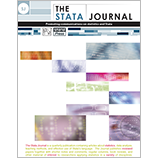giniinc: A Stata package for measuring inequality from incomplete income and survival data
Abstract. Often, observed income and survival data are incomplete because of left- or
right-censoring or left- or right-truncation. Measuring inequality (for
instance, by the Gini index of concentration) from incomplete data like these
will produce biased results. We describe the package giniinc, which
contains three independent commands to estimate the Gini concentration index
under different conditions. First, survgini computes a test statistic
for comparing two (survival) distributions based on the nonparametric
estimation of the restricted Gini index for right-censored data, using both
asymptotic and permutation inference. Second, survbound computes
nonparametric bounds for the unrestricted Gini index from censored data.
Finally, survlsl implements maximum likelihood estimation for three
commonly used parametric models to estimate the unrestricted Gini index, both
from censored and truncated data. We briefly discuss the methods, describe the
package, and illustrate its use through simulated data and examples from an
oncology and a historical income study.
View all articles by these authors:
Long Hong, Guido Alfani, Chiara Gigliarano, Marco Bonetti
View all articles with these keywords:
survgini, survbound, survlsl, Gini index, income distribution, inequality, survival analysis, censored data, truncated data
Download citation: BibTeX RIS
Download citation and abstract: BibTeX RIS
|
